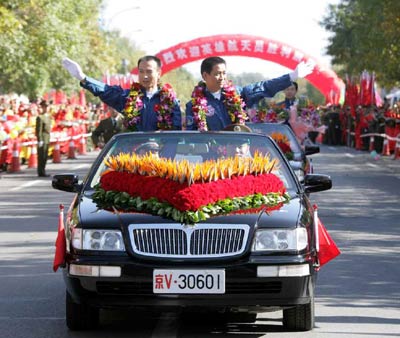|
Stage set for bigger space push
By Li Jing and Jiao Xiaoyang (China Daily)
Updated: 2005-10-18 05:51

Astronauts Fei
Junlong (L) and Nie Haisheng wave to welcoming crowds at a military
airport in west Beijing upon their arrival in the Chinese capital October
17, 2005. [Xinhua] |
Tang said that the first stage of China's space programme, mapped out in
1992, has been completed with the "perfect flight" of Shenzhou VI space walks
and and docking are the next stage.
"The final stage is to set up a permanent space lab and build a space
engineering system," he said, without giving a timetable.
The total cost for Shenzhou VI mission was about 900 million yuan (US$111
million), and all the money was from the central government, said Tang.
Xu Dazhe, deputy general manager of China Aerospace Science and Technology
Group who also addressed yesterday's press conference, said good progress was
being made on an unmanned mission to the moon including lunar orbiting and lunar
landing and a moon-circling satellite is being developed. The mission is named
after the fairy maiden Chang'e who, in classic Chinese tales, is believed to be
living on the moon.
"My corporation is participating in the research and development of the
Chang'e-1 lunar probe satellite and a launch vehicle," Xu said.
At another press conference yesterday, Sun Laiyan, director of the China
National Space Administration, said technology will be further improved to suit
the demands of more challenging space missions.
One challenging job is to develop more powerful and environment-friendly
rockets that can carry more.
Currently, China's rockets have a nine-ton payload for low Earth orbits
ranging from 500 to 2,000 kilometres, and a 5-ton payload for the
36,000-kilometre-high geosynchronous orbit.
The goal is to increase the payload to 25 tons for low Earth orbits and 14
tons for the geosynchronous orbit, according to Sun, who is also deputy head of
the Commission of Science, Technology and Industry for National Defence.
He confirmed China plans to launch its first satellite to orbit the moon
around 2007.
Despite the success of Shenzhou VI that made China only the third
manned-space-exploration country after Russia and the United States, Sun said
there is no room for complacency.
"Many key technological problems need to be addressed, and we need to have
more ability to conduct basic research, more funds and more international
co-operation," said Sun.
(China Daily 10/18/2005 page1)
|